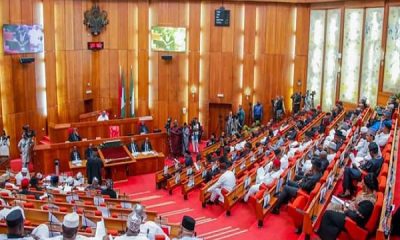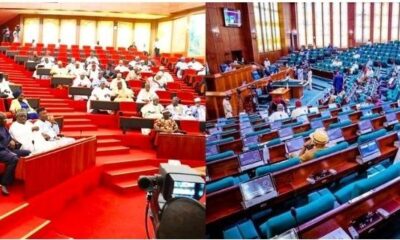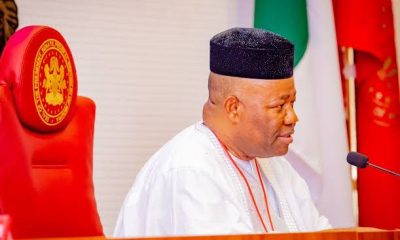News
Senate To Introduce Diaspora Voting

Ahead of the 2027 elections, the Senate is set to amend the Electoral Act to allow for diaspora voting, at least for presidential elections, to enable citizens to vote, especially those on essential service abroad, such as military, paramilitary, and other security personnel abroad, Embassy staff, and other citizens.
The Senate in a communiqué issued at the end of its retreat in Ikot Ikpene, Akwa-Ibom state also resolved to also, make electronic transmission of results mandatory from the next general elections in 2027, including the uploading of polling unit-level results and result sheets used at different levels of result collation.
Sunday PUNCH reports that in events preceding and after the election that brought President Bola Tinubu into power, there were a lot of agitations to allow Nigerians abroad to take part in the elections.
Also, a number of Nigerians called for the electronic transmission of results from the BVAS machine.
The Senate noted that it was necessary for the Independent National Electoral Commission should be unbundled to improve its efficiency and effectiveness in the preparation and conduct of elections.
The communiqué stated, “Relating to the use of technology in elections, remove the ambiguity evident in Section 64 of the EA22. Also, make electronic transmission of results mandatory from the next general elections in 2027, including the uploading of polling unit-level results and result sheets used at different levels of result collation.
“Introduce diaspora voting, at least for presidential elections, to enable citizens to vote, especially those on essential service abroad, such as military, paramilitary, and other security personnel abroad, Embassy staff, and other citizens.
“Relating to political parties; stipulate sanctions for failure to submit the register of party members not later than 30 days before the date of party primaries, congresses, or conventions in relation to Section 77(3) EA22, which the political parties have observed in the breach in the 2023 elections without penalty.”
The 10th Senate further noted that it was time to develop and enact a comprehensive national security strategy that outlines the nation’s security objectives, threats, and policy priorities.
The Red Chamber added that such a strategy can serve as a guiding framework for legislative action in the security sector.
The strategy it noted would, “Address the root causes of terrorism/banditry, which is often driven by poverty, inequality, and a lack of opportunity.
“Promote community policing and engagement to identify and prevent terrorist attacks. The government should also work with civil society organizations and local/ traditional communities to identify and address security concerns. “
The Senate added that it would, “ Establish independent oversight mechanisms for the security sector. These mechanisms can help to investigate allegations of abuse and corruption and to ensure that security forces are accountable to the law.”
The Senate further agreed that legislative engagement and oversight in Nigeria’s security sector can be significantly bolstered through comprehensive legislative reforms.
“These reforms are essential for ensuring that the legislative branch is equipped with the necessary tools and mechanisms to fulfill its critical role in security sector reform,” it explained.
The Senate concluded that “The periodic engagement of the National Assembly with the security chiefs for adequate briefing. There is a need for the Senate President and the Speaker, House of Representatives to be part of the weekly security briefing that goes to the President.”
In a bid to salvage the economic situation of the country, the Senate has proposed the enactment of an Emergency Economic Intervention Bill.
It explained that “This will address critical socio-economic issues concerning foreign exchange management, tackling inflation, stimulating economic growth, and creating more jobs.
“Enforce consequences for violations of any provisions of the law regarding monetary and fiscal matters.
“This will require amendments to the relevant laws to ensure effective oversight and enforcement of the consequences, as the case may be.”
Also agreed was the “need for legislation that clearly defines the taxing rights of the three levels of government.
“ Need for legislative intervention to promote the optimization of revenue from non-oil sources, especially in the solid mineral sector.”
News
Senate approves death penalty for drug traffickers
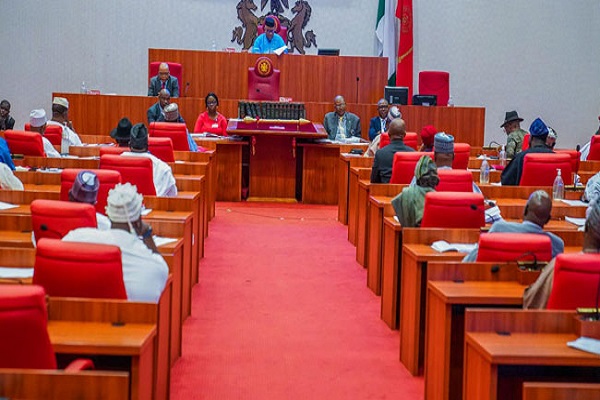
Senate on Thursday, May 9, approved the death penalty for those convicted on the charge of drug trafficking in the country.
The punishment prescribed in the extant NDLEA Act is a maximum sentence of life imprisonment.
The resolution of the Senate followed its consideration of a report of the Committees on Judiciary, Human Rights and Legal Matters and Drugs and Narcotics, National Drug Law Enforcement Agency (NDLEA) Act (Amendment) Bill, 2024.
The Chairman of the Committee on Judiciary, Human Rights & Legal Matters presented the report during plenary, Senator Mohammed Monguno (APC-Borno North).
The bill, which passed its third reading, aims to update the list of dangerous drugs, strengthen the operations of the NDLEA, review penalties, and empower the establishment of laboratories.
Section 11 of the current act prescribes that “any person who, without lawful authority; imports, manufactures, produces, processes, plants or grows the drugs popularly known as cocaine, LSD, heroin or any other similar drugs shall be guilty of an offence and liable on conviction to be sentenced to imprisonment for life” was amended to reflect a stiffer penalty of death.
Although the report did not recommend a death penalty for the offence, during consideration, Senator Ali Ndume moved that the life sentence should be upgraded to the death penalty.
During a clause-by-clause consideration of the Bill, Deputy Senate President Barau Jibrin, who presided over the session, put the amendment on the death penalty to a voice vote and ruled that the “ayes” had it.
But Senator Adams Oshiomhole objected to the ruling, saying that the “nays” had it.
He argued that matters of life and death should not be treated hurriedly, but Barau said it was too late, as he failed to call for division immediately after his ruling.
The bill was subsequently read for the third time and passed by the Senate.
News
Shan George’s money returned to Zenith Bank account

Nollywood actress Shan George is happy to announce to you all that her N3.6million which was removed from her Zenith Bank account has successfully been recovered and returned back into her account by Zenith Bank.
She however thanks everyone, that “To all those who called, txted, and even sent me their token to enable me pursue d issue, God bless u abundantly and replenish ur pockets a billion folds.”
-

 Headline1 day ago
Headline1 day agoSuspend cybersecurity levy– Reps to CBN
-

 Headline1 day ago
Headline1 day agoTinubu resumes work after foreign trip
-

 Business1 day ago
Business1 day agoNigeria needs over $2bn to revive Ajaokuta Steel Plant, says Minister
-

 News1 day ago
News1 day agoShan George’s money returned to Zenith Bank account
-
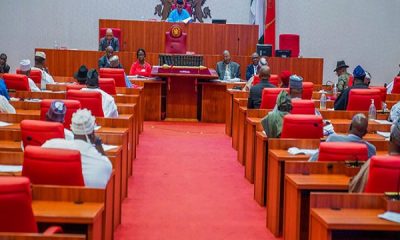
 News1 day ago
News1 day agoSenate approves death penalty for drug traffickers

